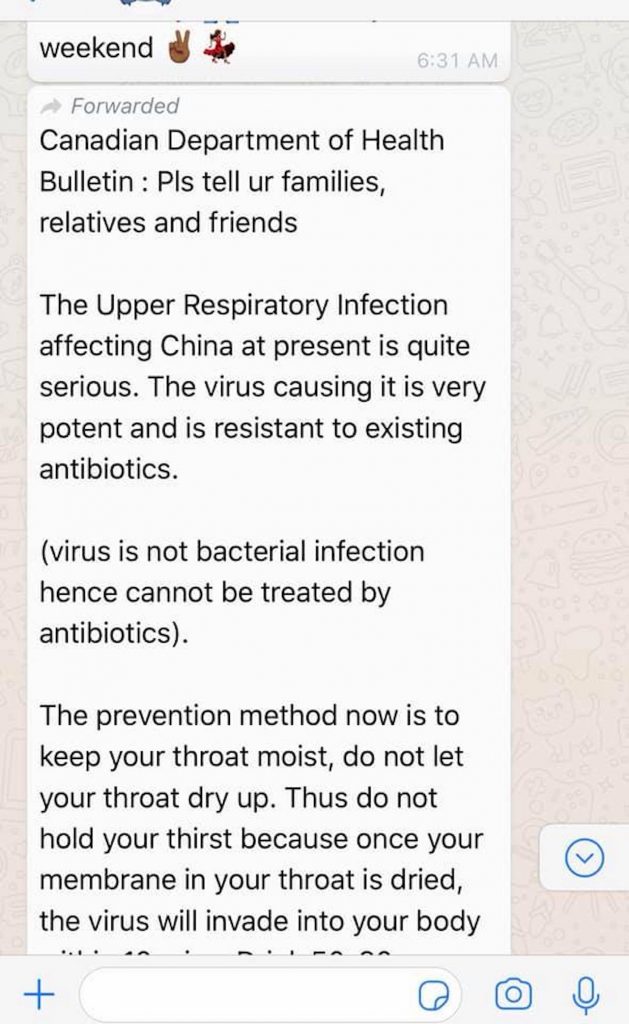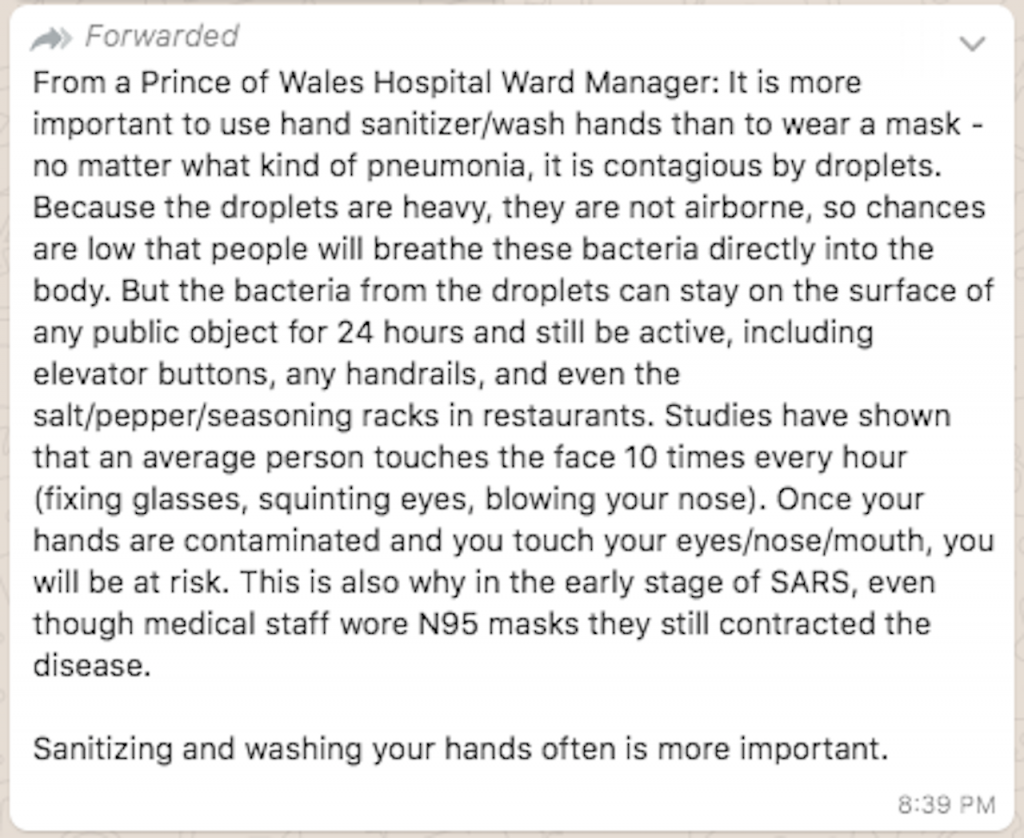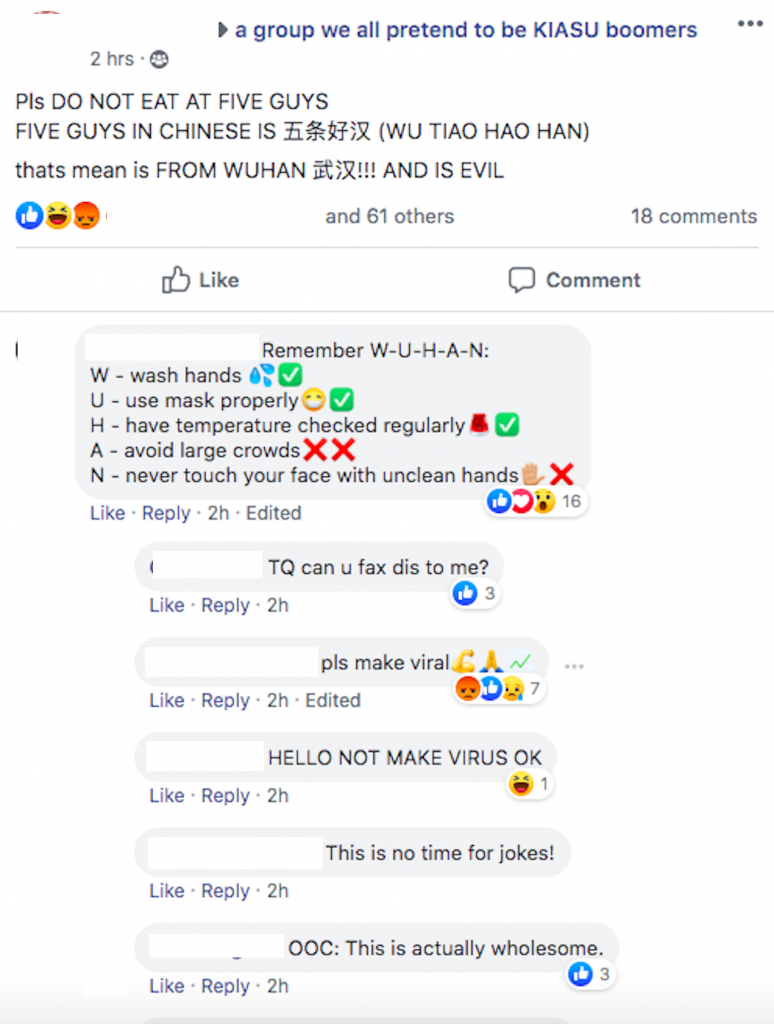Over the Chinese New Year, my 28-year-old cousin said, “You know, before this whole virus thing, I didn’t even know Wuhan existed.”
In some way, I understand his ignorance. When most of us think of China, we don’t immediately think of Wuhan—a city that will, unfortunately, be associated with the Coronavirus from now. But since the virus started to spread, “Wuhan” has infiltrated family Whatsapp group chats as an acronym for … well, this:
gd morning frens 
Remember W-U-H-A-N:
W – wash hands frequently
U – use mask properly
H – have temperature checked regularly
A – avoid large crowds
N – never touch your face with unclean hands
Tk care n gods blesses~
Boomer speak has always been around. For now, similar to the Coronavirus, there is no known cure. And many of us continue to lament boomer speak as older family members spreading ‘fake news’ in family Whatsapp group chats.
Until ‘ok, boomer’ started gaining traction, the unique style of text communication from our parents stayed out of the spotlight.


With almost 6,000 members, the group has multiple posts per day imitating boomer speak around the Coronavirus, referencing the paranoid messages that get forwarded through family Whatsapp group chats. Often, these messages include weak attempts at fearmongering, such as citing seemingly important personnel like the “Canadian Department of Health” and the “Prince of Wales Hospital Ward Manager”, while others dole out obvious statements about protecting one’s health.
One Whatsapp message received by a member of the group reads, “The prevention method now is to keep your throat moist, do not let your throat dry up. Thus do not hold your thirst because once your membrane in your throat is dried, the virus will invade into your body.”
In a normal post update, another member lists “decoction of Tulsi, Ginger, Pepper, Curcumin in hot water” and taking “hot rasam or vegetable soups” as precautions against the Coronavirus.
Often, it’s hard to tell whether updates are satire or actual Whatsapp messages sent to the original poster’s family group chat. But members would argue that the ‘beauty’ of the group lies in blurring the lines between fiction and reality.
Ironically, everyone in the group has learnt to imitate boomer speak so effectively, that the group becomes a fine specimen of how vastly different various generations of Singaporeans process the Coronavirus news. We can’t avoid the significance of digital literacy, especially when the news directly impacts everyone’s lives.


So if this performance art appears to miss its mark, you’re probably not its intended audience. It might also appear to complicate the situation or prevent you from truly understanding the news.
In reality, the group’s disclaimer explicitly states: “The intention of the group is not to shame, insult or hate on any particular group of people.” They hope that by imitating how the elderly “adapt to modern technological times”, they are able to “bridge an understanding of the difficulties the past generation and marginalised communities face in this fast-changing world.”





For instance, posting a Facebook comment on PM Lee’s post asking why he does not send every PRC in China back home? Boomer. Asking what the PAP is doing to restock the masks in pharmacies? Boomer. Forwarding an unverified WhatsApp message about the health risk of going out in public without a mask, and hence imploring everyone to stay home unless protected? Boomer. Praying for Singapore in any Facebook comments section of a news article, complete with ‘praying’ emoji? Definitely Christian boomer.
Unlike their Generation Z and millennial counterparts, who frequently cloak their communication with irony, a boomer’s style of online communication is characterised by sheer earnestness. In this case, there’s also genuine paranoia.
As a result, the group’s adopted boomer speak carries an equal sense of endearment and frustration, just like you would when you try to explain technology to your parents. In this case, it seems to become a coping mechanism for the annoyance that the older generation—the very people who’ve taught us to be cautious online—are becoming susceptible to fear-mongering and fake news. The young want to educate their parents and older relatives, but helplessness feels inevitable, especially when every forwarded Whatsapp message appears to deepen the misinformation and sense of fear in its elderly recipient.
The disparity among how different generations take to the news is nothing new, but this growing divide in digital literacy only gets heightened in the wake of major crises.







